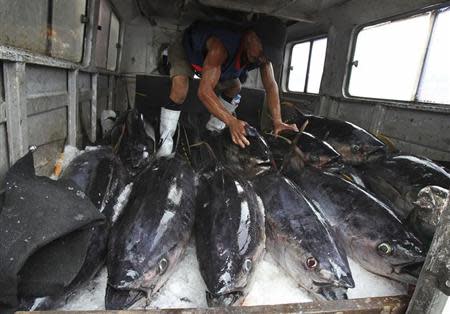Mozambique sells debut $500 mln bond to fund tuna fishing

By Tosin Sulaiman JOHANNESBURG (Reuters) - A new Mozambican state agency issued a $500 million bond on Thursday to buy a tuna fleet, offering investors rare exposure to one of Africa's fastest growing economies with - besides fisheries - huge coal and gas reserves. The government-guaranteed, seven-year bond was the country's first dollar issue. It was sold at a yield of 8.5 percent, a source with knowledge of the deal said. Its size makes it eligible for JP Morgan's influential emerging markets EMBI index and gives it a level of liquidity that the government's local-currency bond offerings lack. Rated B+ by Standard and Poor's and Fitch, Mozambique issued just one local-currency bond a year between 2008 and 2012 and secondary market trading is virtually non-existent. This year it issued bonds in two small tranches and is set to issue a third this month. Treasury bill auctions are restricted to local investors. "There are almost no liquid Mozambican assets in the market so this makes it a fairly unique asset that gives investors access to Mozambican risk," Standard Bank emerging markets analyst Yvette Babb said. Mozambique's economy is forecast to grow at 7 percent this year and enough gas reserves to supply Germany, Britain, France and Italy for 15 years. Vast untapped coal reserves have drawn in firms such as Brazil's Vale and Rio Tinto. Foreign direct investment (FDI) doubled to $5.2 billion in 2012, according to the U.N., while FDI to Africa as a whole increased 5 percent to $50 billion. The state agency, Ematum, was incorporated in Mozambique last month with the main purpose is "the fishery activity of tuna and other fish resources", according to the prospectus. The proceeds will go towards "financing the purchase of fishing infrastructure, comprising of 27 vessels, an operations centre and related training", it said. Stephen Charangwa, fixed income portfolio manager at Silk Invest, said that the bond should increase Mozambique's visibility to foreign investors, an important step should it decide to sell a Eurobond in the future. "It's a way of introducing the sovereign to the market and an attempt to also gauge how much interest is out there. We saw that with Angola which became more visible. Foreign investors started looking at the credit metrics and fundamentals of Angola a lot more carefully," he said, referring to a privately placed $1 billion Angolan bond issued last August. Investors may wonder, however, why the proceeds are going towards the fishing industry rather than more conventional road, power or transport sectors, Standard Bank's Babb said. "It does the raise the question as to why the government would issue a government guarantee for this size to a fairly unknown government agency in the fishing industry while there are a large number of other perhaps more constructive projects with a higher return in that economy," she said. She also said a Eurobond - with greater transparency - might have sold better internationally. The 8.5-percent yield is more expensive than the 8 percent paid by similarly rated Ghana for its second $750 million 10-year Eurobond in July. BNP Paribas and Credit Suisse were lead arrangers.
